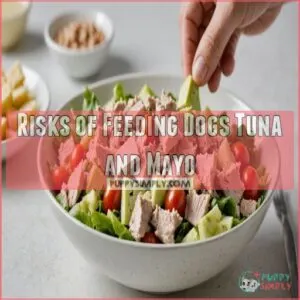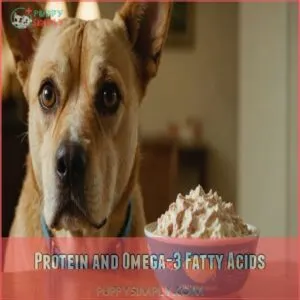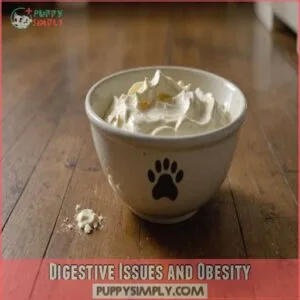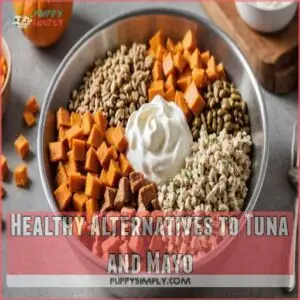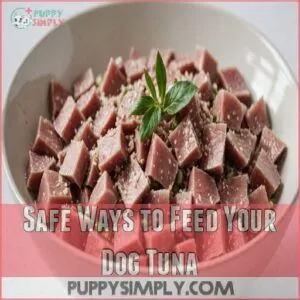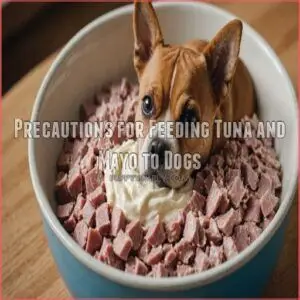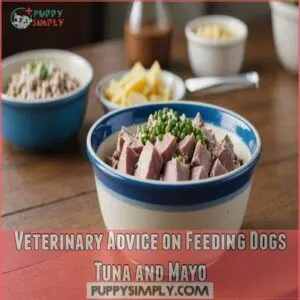This site is supported by our readers. We may earn a commission, at no cost to you, if you purchase through links.

Tuna itself is a decent treat for dogs in moderation, thanks to its protein and omega-3s.
But add mayo to the mix, and you’ve got a recipe for trouble.
Mayonnaise is loaded with fat and calories, which can lead to weight gain and digestive issues in your furry friend.
Plus, it sometimes contains garlic and onion powder—big no-nos for dogs.
So, save the tuna sandwiches for yourself, and treat your dog to plain tuna instead.
Stick around to discover some tasty—and safe—alternatives your pup will love!
Table Of Contents
- Key Takeaways
- Risks of Feeding Dogs Tuna and Mayo
- Benefits of Tuna for Dogs
- Dangers of Mayonnaise for Dogs
- Why Tuna and Mayo is a Bad Combination
- Healthy Alternatives to Tuna and Mayo
- Safe Ways to Feed Your Dog Tuna
- Can Dogs Eat Tuna Every Day?
- What to Do if Your Dog Eats Tuna and Mayo
- Precautions for Feeding Tuna and Mayo to Dogs
- Veterinary Advice on Feeding Dogs Tuna and Mayo
- Frequently Asked Questions (FAQs)
- Can dogs eat mayonnaise?
- Can dogs eat tuna mayo?
- Can dogs eat tuna salad?
- Is tuna good for dogs?
- Can a Dog Eat Too Much Tuna?
- Can dogs eat canned tuna?
- Can dogs eat canned tuna?
- How much mayonnaise can a dog eat?
- What can I mix with tuna for my dog?
- Can dogs have tuna with relish?
- How often can dogs safely eat tuna?
- What symptoms indicate a dog is allergic to tuna?
- Is there a safe amount of mayo for dogs?
- Can tuna upset a dogs stomach?
- Do all dogs react the same to tuna?
- Conclusion
Key Takeaways
- Don’t mix mayo with tuna for your dog; the mayo’s high fat and calorie content can lead to digestive issues and weight gain.
- Tuna contains mercury, which can be harmful to dogs in large amounts, so serve it in moderation without additives.
- Watch out for toxic ingredients like garlic and onions often found in mayonnaise, which are dangerous for dogs even in small amounts.
- Opt for healthier alternatives like plain yogurt or mashed sweet potato for a safe and tasty treat for your furry friend.
Risks of Feeding Dogs Tuna and Mayo
While you might think tuna and mayo make a tasty treat for your furry friend, this combination can pose serious health risks due to high mercury levels, excessive fat content, and harmful additives.
Your dog’s digestive system isn’t equipped to handle these human foods, which can lead to problems ranging from upset stomach to long-term health issues.
Mercury Poisoning
Your furry friend’s tuna cravings could lead to mercury poisoning, a serious health concern that builds up over time.
While an occasional bite might seem harmless, regular tuna consumption can accumulate toxic mercury levels in your dog’s system.
- Silent but deadly: Mercury gradually damages your dog’s nervous system
- Invisible threat: Symptoms mightn’t show up immediately
- Long-term impact: Can affect brain function and coordination
- Hidden danger: Larger fish like tuna contain higher mercury concentrations
High Fat and Calorie Content
Beyond mercury concerns, the combination of tuna and mayo packs a hefty caloric punch that could derail your dog’s weight management goals.
A single tablespoon of mayo contains around 90 calories and 10 grams of fat, while oil-packed tuna adds even more.
Regular servings can lead to dog obesity and associated health issues like diabetes, joint problems, and heart disease.
Artificial Additives and Preservatives
While high fat content poses risks, commercial mayo and tuna products often contain artificial additives and preservatives that can harm your dog’s health, which is why many pet owners opt to buy tuna mayo additives to make their own safer alternatives.
These chemical compounds may trigger allergic reactions or digestive issues.
Here’s what to watch for in ingredient labels:
- Sodium nitrite (common in tuna)
- BHA/BHT preservatives
- Artificial flavoring agents
- Added sodium phosphates
These additives can build up in your dog’s system over time, potentially leading to long-term health complications.
Benefits of Tuna for Dogs
You’ll be glad to know that tuna offers your dog valuable nutrients like protein and omega-3 fatty acids that support muscle health and a shiny coat.
While it’s not meant to be a daily meal, you can safely treat your furry friend to small portions of plain, water-packed tuna as an occasional protein boost.
Protein and Omega-3 Fatty Acids
Despite the risks, tuna offers valuable nutrients for your furry friend.
Let’s break down the good stuff packed in this fish.
The protein supports muscle development, while omega-3 fatty acids boost coat health and joint function.
Tuna is also a rich source of vitamins B12, selenium, and niacin, essential for overall well-being, as found in safe tuna options types safe for dogs.
| Nutrient | Benefit | Impact on Dogs |
|---|---|---|
| Protein | Muscle Growth | Supports lean body mass |
| DHA | Brain Function | Enhances cognitive development |
| EPA | Anti-inflammatory | Reduces joint inflammation |
Occasional Treats and Moderation
Tuna can be a tasty treat for your furry friend, but moderation is key.
Just like how you wouldn’t eat ice cream for every meal, your dog shouldn’t have tuna too often.
A small portion once or twice a month is plenty.
You’ll want to keep treats, including tuna, to less than 10% of your dog’s daily caloric intake to maintain a balanced diet.
Dangers of Mayonnaise for Dogs
You’ll want to think twice before sharing that mayo sandwich with your furry friend, as mayonnaise contains high levels of fat and preservatives that can harm your dog’s health.
Your dog’s digestive system isn’t equipped to handle mayonnaise’s rich ingredients, which can lead to upset stomach, weight gain, and potentially serious health issues.
High Fat and Preservative Content
Mayonnaise poses significant risks for your furry friend due to its high fat content and artificial preservatives.
Commercial mayo typically contains unhealthy oils, added chemicals, and stabilizers that aren’t designed for canine consumption.
Store-bought varieties often pack preservatives like calcium disodium EDTA and potassium sorbate, which can build up in your dog’s system over time.
It’s best to skip the mayo altogether.
Digestive Issues and Obesity
After feeding your dog mayonnaise, you might notice some concerning digestive issues that can lead to obesity.
Regular mayo consumption affects your pup in several ways:
- Triggers pancreatitis from excessive fat intake
- Causes uncomfortable bloating and gas
- Leads to rapid weight gain from empty calories
- Results in chronic diarrhea or constipation
These health risks aren’t worth the few seconds of taste enjoyment your dog gets from mayo.
Why Tuna and Mayo is a Bad Combination
You’ll want to think twice before sharing your tuna salad with your furry friend, as this combination packs a dangerous one-two punch of excessive fats and calories.
Tuna salad often contains tuna, which can be fed to dogs in moderation, but should be avoided in dogs with allergies, as discussed in guidelines for feeding fish. Tuna salad often contains harmful ingredients like garlic and onions that can make your dog seriously ill, even in small amounts.
High-Fat and High-Calorie Snack
When you combine these two foods, you’re creating a calorie bomb that could impact your dog’s health.
Let’s break down why this combo isn’t ideal.
Consider opting for a balanced dog food like Kirkland dog food brand that offers a mix of fresh meat, whole grains, and probiotics.
| Issue | Impact | Solution |
|---|---|---|
| Calories | Weight gain | Choose lean proteins |
| Fat content | Digestive upset | Try healthy alternatives |
| Portion control | Obesity risk | Stick to dog treats |
Remember, showing love through food doesn’t mean overfeeding.
Your pup will be just as happy with healthier snack alternatives or homemade recipes specifically designed for dogs.
Toxic Ingredients Like Garlic and Onions
Your seemingly harmless tuna and mayo sandwich might contain hidden dangers for your furry friend.
Commercial mayonnaise often includes garlic and onion powders as flavor enhancers, but these ingredients are toxic to dogs.
Even small amounts can damage your pet’s red blood cells, potentially leading to anemia.
What’s worse, these seasonings can be hard to spot on labels, hiding under terms like "natural flavors" or "spices.
Healthy Alternatives to Tuna and Mayo
You’ll be glad to know there are tasty and safe alternatives to tuna and mayo that your furry friend can enjoy.
From protein-rich plain yogurt to vitamin-packed sweet potato and pumpkin, you’ve got plenty of healthy options that won’t put your dog’s health at risk.
Plain Unsweetened Yogurt
Plain, unsweetened yogurt stands as a nutritional powerhouse for your furry friend.
It’s packed with protein, calcium, and beneficial probiotics that support digestive health.
Unlike tuna and mayo, yogurt offers a safe, low-fat alternative that won’t upset sensitive stomachs.
Just remember to choose varieties without artificial sweeteners or additives.
Start with small portions to see if your pup tolerates it well.
Homemade Dog-Friendly Mayo Recipes
Instead of store-bought mayo, try these dog-safe alternatives you can whip up at home.
Mix Greek yogurt with a touch of olive oil and apple cider vinegar for a creamy spread.
Another option combines mashed avocado with coconut oil for healthy fats.
Remember to skip ingredients like garlic or onion powder.
These homemade versions give your pup the texture they love without the risks.
Mashed Sweet Potato and Pumpkin
Both mashed sweet potato and pumpkin pack a nutritious punch as wholesome alternatives to tuna and mayo.
These fiber-rich vegetables support healthy digestion and can help manage your dog’s weight.
Simply steam and mash sweet potatoes or use plain canned pumpkin (not pie filling).
Add a small spoonful to your pup’s meals, and you’ll have a tail-wagging treat that’s both safe and delicious.
Safe Ways to Feed Your Dog Tuna
You can safely treat your dog to tuna by choosing unsalted, water-packed varieties and limiting portions to occasional small servings.
When you’re sharing this protein-rich fish with your furry friend, you’ll want to avoid any artificially flavored options that could contain harmful additives.
Canned Tuna Packed in Water
When feeding your dog tuna, canned varieties packed in water offer the safest option.
Here’s what you need to know about choosing the right canned tuna:
- Check mercury levels – light tuna typically contains less mercury than white or albacore
- Look for "packed in water" on the label, avoiding oil-based options
- Verify water quality through trusted brands
- Consider portion sizes based on your dog’s weight
Double-check expiration dates and store unopened cans properly.
Avoiding Artificially Flavored Varieties
Artificially flavored tuna varieties often contain additives and preservatives that can harm your dog’s digestive system.
You’ll want to carefully check those labels for hidden ingredients like garlic powder, onion extract, or artificial sweeteners – they’re no friends to your furry companion.
Stick to plain, unflavored tuna in water, and your pup will thank you with a wagging tail and a happy tummy.
Serving in Moderation
Serving tuna to your dog requires careful portion control based on their size and weight.
Think of tuna like dessert – an occasional treat rather than a daily staple.
Your furry friend might beg for more, but moderation is key to preventing mercury buildup.
- Small dogs (under 20 lbs): limit to 1 tablespoon weekly
- Medium dogs (20-50 lbs): up to 2 tablespoons weekly
- Large dogs (over 50 lbs): maximum 3 tablespoons weekly
- Skip a week between servings for extra safety
Can Dogs Eat Tuna Every Day?
While you might think tuna’s protein-rich goodness makes it perfect for your dog’s daily diet, veterinarians warn against frequent consumption due to dangerous mercury levels.
You’ll want to limit tuna treats to once or twice a month to keep your furry friend healthy and safe.
Risks of Frequent Consumption
Frequent tuna consumption can lead to dangerous mercury buildup in your dog’s system.
You’re playing with fire if you make it a daily treat, as mercury accumulates over time, potentially causing serious liver damage and kidney problems.
Even small, regular servings can add up, putting your furry friend at risk for neurological issues and weight gain.
Watch out for signs of digestive upset too.
Importance of Balance and Moderation
Balance is key when feeding your dog tuna.
While it’s tempting to share this fishy treat daily, think of tuna like dessert – it’s best saved for special occasions.
When pairing tuna with mayo, consider using dog safe mayo products to avoid any potential health risks.
Your pup’s main meals should focus on complete, balanced dog food that meets their nutritional needs.
Consider the 90/10 rule: 90% regular meals, 10% treats to maintain a healthy weight.
What to Do if Your Dog Eats Tuna and Mayo
If your dog sneaks a taste of tuna and mayo, keep an eye out for any tummy troubles or odd behaviors.
Don’t hesitate to give your vet a ring for peace of mind and expert advice.
Monitoring for Adverse Reactions
If Fido accidentally nibbles on a tuna and mayo combo, here’s what to watch for: Keeping an eye on tuna consumption is important, as excessive amounts can lead to mercury poisoning, which is why it’s recommended to feed dogs tuna in moderation.
- Digestive upset: Vomiting or diarrhea might pop up like unwanted guests.
- Allergic reactions: Look for skin irritation or itching that could drive your pup nuts.
- Behavioral changes: Keep an eye out for lethargy or unusual behavior.
Catch these signs early to keep your dog safe.
Consulting a Veterinarian for Advice
After watching your dog for any unusual symptoms, reach out to a vet for personalized advice.
Think of them as your dog’s nutritional guru, helping guide you through dietary restrictions and health concerns.
They’ll know just what to do if your pup indulges in tuna and mayo, ensuring the safe treats align with your pup’s nutritional needs and overall well-being.
Precautions for Feeding Tuna and Mayo to Dogs
When feeding your dog tuna and mayo, you should keep in mind their age, weight, and any health conditions or allergies.
Don’t leave food unsupervised, as curious pups might help themselves to a risky snack.
Age and Weight Considerations
You’re not alone if you’re pondering how tuna and mayo fit into your dog’s life, especially considering age and weight.
- Puppy diet: Keep it balanced, avoiding high-calorie treats.
- Senior dog: Watch for digestion issues.
- Weight management: Stick to occasional treats.
- Overweight dogs: Skip extra calories.
- Underweight dogs: Consult a vet for advice.
Finding that sweet spot guarantees a happy, healthy pup!
Health Conditions and Allergies
Before giving your dog tuna or mayo, consider their health and the potential risks of mercury poisoning, which can be especially problematic for dogs due to sensitivity to mercury levels.
Some dogs have tuna allergies or other food sensitivities.
Digestive issues can worsen with high-fat foods like mayo.
Kidney and liver health are also factors; these organs process toxins.
Always check with your vet before adding new foods, especially if your pup has pre-existing conditions.
A balanced diet is key!
Unsupervised Food Access
Food safety in your home can prevent curious dogs from licking tuna and mayo off unattended plates.
Watch out for kitchen hazards and pet-proof areas where food’s stored.
It’s like toddler-proofing but for furry noses!
Checking cupboards and securing countertops can save you a trip to the vet.
Remember, dog behavior modification often starts with controlling their environment.
Veterinary Advice on Feeding Dogs Tuna and Mayo
When you’re thinking about feeding your dog tuna and mayo, play it safe and check with your vet first.
They can offer personalized dietary advice to make sure you’re not turning your pup into a couch potato.
Importance of Consultation
Giving your dog tuna and mayo can open a can of worms (or fish).
Checking in with your vet first isn’t just smart, it’s necessary, especially if your dog has a sensitive stomach that may require a specific diet like sensitive stomach dog food.
Here’s what to ask:
- Dog food allergies
- Vet recommendations
- Dietary needs
- Health concerns
Keep your four-legged friend safe by making informed decisions about food safety and health.
Personalized Dietary Recommendations
Veterinarians are like doggy nutritionists, helping pinpoint breed-specific needs and address food sensitivities.
They’re your best ally when crafting age-based diets, considering factors like health conditions and dog food allergies, which may be alleviated with the right hypoallergenic dog food.
Picture a customized menu just for your pup:
| Factor | Consideration | Example |
|---|---|---|
| Age | Nutritional needs vary | Puppies need more protein |
| Breed | Specific dietary needs | Dalmatians need low purine food |
| Sensitivities | Allergy management | Avoid common allergens like grains |
Frequently Asked Questions (FAQs)
Can dogs eat mayonnaise?
No, mayo’s a no-go for your furry friend! It’s packed with fat and preservatives, potentially causing tummy troubles. Stick to dog-friendly treats; your vet can advise on safe options.
Can dogs eat tuna mayo?
Mixing tuna with mayo for your dog isn’t ideal.
While tuna offers protein, the mayo’s high fat content can lead to health issues.
It’s better to opt for safer snacks, like plain yogurt or sweet potato.
Can dogs eat tuna salad?
Tuna salad might seem like a tasty treat for your dog, but it’s risky.
Ingredients like mayo, onions, and salt aren’t dog-friendly.
Instead, try plain tuna (in moderation) or consult your vet for dog-safe alternatives.
Is tuna good for dogs?
Tuna’s a tasty treat for dogs, thanks to its protein and omega-3 content.
But, be cautious—too much can cause mercury poisoning.
Serve it in moderation, plain and unsalted, while keeping an eye out for reactions.
Can a Dog Eat Too Much Tuna?
Too much tuna for dogs can lead to mercury poisoning, posing health risks.
Moderation is key; save tuna as a rare treat.
Stick to water-packed varieties, avoid seasonings, and always consult your vet before adding new foods.
Can dogs eat canned tuna?
Canned tuna can be a balancing act for dogs—it offers protein and omega-3s, but high mercury levels make it risky.
Choose unsalted tuna in water, give sparingly, and always monitor your furry friend’s response.
Can dogs eat canned tuna?
Dogs can occasionally enjoy canned tuna, providing protein and omega-3s.
Unsalted tuna in water is the best choice to avoid the high mercury risk.
Always serve in moderation and watch for any negative reactions in your furry friend.
How much mayonnaise can a dog eat?
It’s a big no-no for pups. Too much fat and salt can upset their tummies. Stick to dog-friendly treats; your vet can advise on safe options.
What can I mix with tuna for my dog?
Imagine a culinary landscape for your pup; mix plain yogurt or pumpkin with tuna to create a safe, savory delight.
These additions are gentle on tummies and packed with nutrients, ensuring a tasty and healthy treat.
Can dogs have tuna with relish?
Mixing tuna with relish for your dog isn’t ideal.
Relish often contains sugar, onions, and vinegar, which can upset your dog’s stomach.
Stick to plain, water-packed tuna occasionally and always monitor for adverse reactions.
How often can dogs safely eat tuna?
How often is too often for a dog to eat tuna?
Stick to occasionally—once every week or two—to avoid mercury buildup.
Opt for water-packed, unsalted tuna, and watch for any tummy troubles.
Keep it simple, keep it safe!
What symptoms indicate a dog is allergic to tuna?
If your dog shows signs like itching, hives, vomiting, or diarrhea after eating tuna, it might be allergic.
Allergic reactions can be serious, so watch for trouble breathing or swelling.
If you notice any of these signs, consult your vet to make sure your furry friend’s safety and comfort.
Is there a safe amount of mayo for dogs?
Feeding dogs mayo is like playing with fire—it’s too fatty and calorie-laden, potentially leading to obesity or digestive issues.
Even a small amount can upset their tummy, so it’s best to steer clear altogether.
Can tuna upset a dogs stomach?
Yes, tuna can upset your dog’s stomach if consumed in large amounts due to its rich mercury levels.
Start with small portions, monitor their reaction, and consult your vet if you notice any digestive issues.
Do all dogs react the same to tuna?
No two dogs are alike; reactions to tuna vary. Some dogs tolerate it fine, while others might get an upset tummy. Always watch your pup closely after trying new foods.
Conclusion
Consider Hercules, who’d avoid a soy burger for strength.
Similarly, feeding dogs mayo and tuna isn’t advisable.
While tuna offers protein and omega-3s, combining it with mayo, packed with fats and risky additives, spells trouble for your pooch.
Regularly serving mayo-loaded tuna can lead to mercury risks and obesity.
Instead, safer alternatives like plain yogurt or a vet-recommended diet keep their tails wagging happily.
Think twice before serving those tuna sandwiches to your dog!

